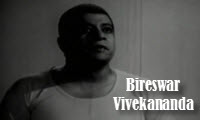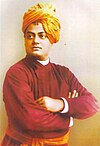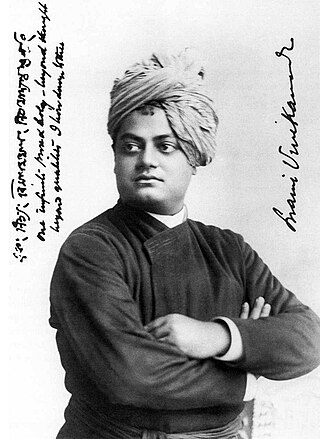
Swami Vivekananda, born Narendranath Datta, was an Indian Hindu monk, philosopher, author, religious teacher, and the chief disciple of the Indian mystic Ramakrishna. He was a key figure in the introduction of Vedanta and Yoga to the Western world, and the Father of modern Indian nationalism who is credited with raising interfaith awareness and bringing Hinduism to the status of a major world religion.

Shuddhananda who was the fifth president of the Ramakrishna Order, was a direct monastic disciple of Vivekananda. He joined the Ramakrishna Math in 1897. He became a trustee of Ramakrishna Math and a member of the governing body of Ramakrishna Mission in May 1903. He also took up the editorship of the Bengali magazine called Udbodhan for sometime. He was appointed as the secretary of the math and the mission in 1927 and as the vice president in 1937. In 1938, he became the president of the order. His tenure was short, as he died in 1938. He is renowned in the literary circles to have translated most of Vivekananda's original works from English to Bengali.

Swami Virajananda, born Kalikrishna Bose, was an initiated disciple of Sarada Devi and the sixth president of the Ramakrishna Order. Born as the son of Trailokyanath Bose and Nishadkalidevi, Virajananda was the first person to join the Ramakrishna Order after the direct disciples of Ramakrishna. In 1897, he was initiated into sannyasa by Vivekananda. From 1899 onward he served in Advaita Ashrama, Mayavati and became its president in 1906. He is recognised as a monastic disciple of Vivekananda.

Belur Math is the headquarters of the Ramakrishna Math and Ramakrishna Mission, founded by Swami Vivekananda, the chief disciple of Ramakrishna Paramahamsa. It is located in Belur, West Bengal, India on the west bank of Hooghly River. Belur Math was established in January 1897, by Swami Vivekananda who was the disciple of Sri Ramakrishna. Swami Vivekananda returned back to India from Colombo with a small group of disciples and started work on the two one at Belur, and the others at Mayavati, Almora, Himalayas called the Advaita Ashrama. The temple is the heart of the Ramakrishna movement. It is notable for its architecture that fuses Hindu, Islamic, Buddhist, and Christian art and motifs as a symbol of unity of all religions. In 2003, Belur Math railway station was also inaugurated which is dedicated to Belur Math Temple.

Sister Nivedita was an Irish teacher, author, social activist, school founder and disciple of Swami Vivekananda. She spent her childhood and early youth in Ireland. She was engaged to marry a Welsh youth, but he died soon after their engagement.

Swami Vivekananda is a 1998 Indian biographical film directed by G. V. Iyer and produced by T. Subbarami Reddy. It took Iyer 11 years to finish the research work required for the film and to write the screenplay.
Swami Vivekananda is a 1955 Hindi language Indian feature film produced and directed by Amar Mullick, starring Ajit Prakash, Bharati Devi, Anubha Gupta Manoranjan Bhattachary etc. The film was based on the biography of Indian Hindu monk Swami Vivekananda. The film is considered a "faithful and memorable documentation feature" on Vivekananda.
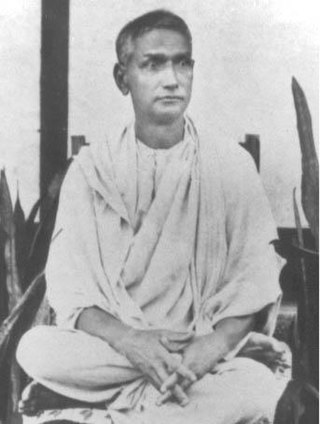
Nirmalananda, born as Tulasi Charan Dutta in Calcutta, was a direct disciple of Ramakrishna, the 19th-century mystic and Hindu saint from India, and took Sanyasa from Vivekananda along with Brahmananda and others. He was initiated by Sri Ramakrishna, on which fact a few latter-day antagonists tried to cast doubt in the Bangalore Court, but into which question the Court refused to get into. Nirmalananda played a key role in establishing Ramakrishna Math and Mission chiefly in South India, in Kerala and Bangalore and Tamil Nadu and also in the USA, Burma and Bangladesh.
Gurudas Banerjee, also known as Gurudas Bandyopadhyay, is a Bengali stage and film actor who was active from the 1940s through the 1980s. As an actor, he commonly played holy men, especially the 19th century Bengali mystic Sri Ramakrishna, a role he was said to "almost monopolize." He acted in more than 80 films, mostly in Bengali. With his wife, actress Molina Devi, he also directed a Calcutta-based theatre troupe, M. G. Enterprises.

Biley or Bilay is a 2012 Bengali drama created by Bengali theatre group Lokkrishti, This is a dramatisation of the life and works of Swami Vivekananda. Debshankar Haldar played the lead role. Phalguni Chattopadhyay directed this drama and Ujjwal Chattopadhyay was the playwright.
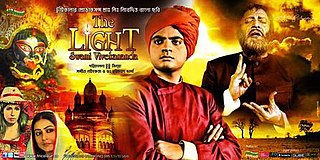
The Light: Swami Vivekananda (2013) is a bilingual film directed by Utpal (Tutu) Sinha and produced by Tri Colour productions private limited. The film is based on the life and teaching of Swami Vivekananda. The film was a tribute to Vivekananda on the 150th anniversary of his birth. The film was dubbed in 18 languages.

Swami Vivekananda was an Indian Hindu monk. He was a key figure in the introduction of the Hindu philosophies of Vedanta and Yoga to the western world. The 150th birth anniversary of Swami Vivekananda was celebrated all over India and in different countries in the world. Ministry of Youth Affairs & Sports of India decided to observe 2013 as the year of 150th Birth Anniversary of Swami Vivekananda. Year-long events and programs were organised by different branches of Ramakrishna Math, Ramakrishna Mission, central government and different state governments of India, education institutions, youth groups etc. Bengali film director Tutu (Utpal) Sinha made a film The Light: Swami Vivekananda as a tribute to Swami Vivekananda on his 150th birth anniversary. The movie was released on 23 August 2013.
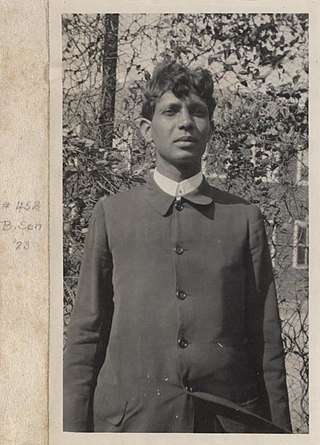
Basiswar "Boshi" Sen was an Indian agricultural scientist. He was a pioneer of the Green Revolution movement that changed the food landscape of India by growing abundant food grains, thereby reducing the possibility of any famine in the country. His wife was Gertrude Emerson Sen, an American author and specialist on Asia. He founded the Vivekananda Laboratory in the Almora region of the Himalayas. He was a friend of many notable people, such as Indian Prime minister Jawaharlal Nehru, poet Rabindranath Tagore, Julian Huxley, and D. H. Lawrence. Sen was also associated with the Ramakrishna Order and the Ramakrishna Vivekananda movement, as well as with Jagadish Chandra Bose, the Indian scientist, and Sister Nivedita, the writer, orator, freedom fighter and direct disciple of Swami Vivekananda. The Government of India awarded him the third-highest civilian honour of Padma Bhushan in 1957.

Swami Vivekananda, the nineteenth-century Indian Hindu monk, is considered one of the most influential people of modern India and Hinduism. Rabindranath Tagore suggested to study Vivekananda's works to learn about India. Indian independence activist Subhas Chandra Bose regarded Vivekananda as his spiritual teacher. Mahatma Gandhi said that after reading the works of Vivekananda, his love for his nation became a thousand-fold.

Sangeet Kalpataru is a Bengali language song anthology edited and compiled by Swami Vivekananda and Vaishnav Charan Basak. The book was first published in August or September 1887 from Arya Pustakalaya, Calcutta. In 2000, the book was reprinted by the Ramakrishna Mission Institute of Culture. It was edited with a critical introduction by Dr. Sarbananda Choudhury.

Charlotte Sevier, also known as Mrs. Sevier, was a direct disciple of Swami Vivekananda and was British in origin. She, together with her husband James Henry Sevier established the Advaita Ashrama in Mayavati, a branch of the Ramakrishna Order, in the Himalayas.

Pransakha Vivekananda (2015) is a Bengali biographical novel written by Ranjan Bandyopadhyay. The book has 3 volumes. It was at the first position in Anandabazar Patrika's ten weekly popular books' list in October 2015.
Molina Devi, also known as Molina Debi and Malina Debi, was an Indian Bengali actress of Bengali and Hindi film and theatre. As an actress, she played a wide variety of parts, later frequently playing matronly parts, especially Rani Rashmoni, patroness of the 19th century Bengali mystic Sri Ramakrishna. She acted in several dozen films, mostly in Bengali and Hindi. With actor Gurudas Banerjee, she also directed a Calcutta-based theatre troupe, M. G. Enterprises.
